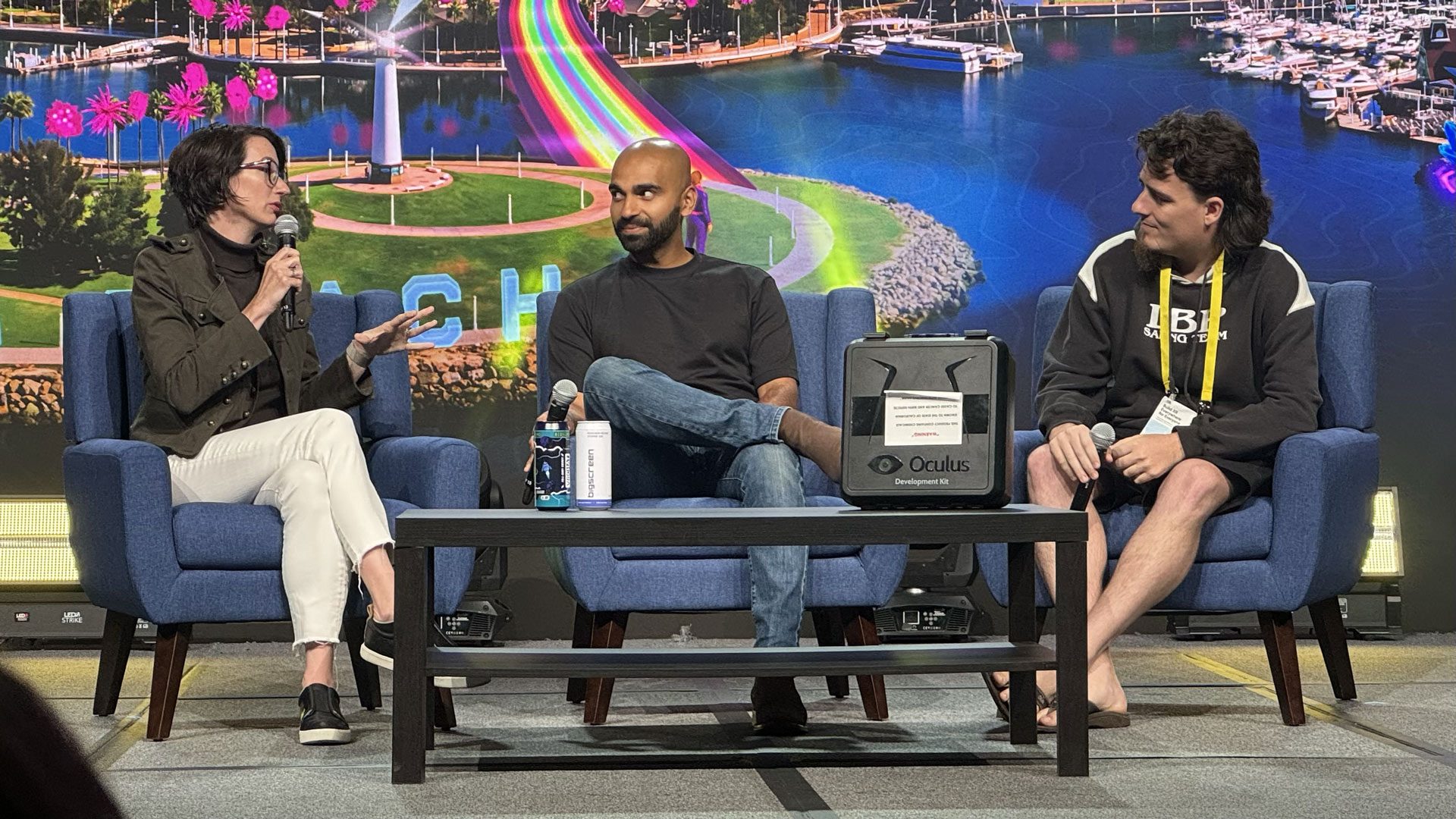
This week at AWE 2024, Oculus founder Palmer Luckey spoke briefly about a new XR headset he’s developing. Though the headset would see Luckey returning to the XR space, this one is being built with military, rather than consumer, uses in mind.
Luckey confirmed earlier this month that he intends to build a new XR headset, but revealed almost no details about the project.
During a panel discussion today at AWE 2024, he offered just a bit more, saying the headset’s design is “being driven by military requirements, but also going to be used for non-military stuff. It’s really cool, it’s really something.”
Though Luckey was on stage with Bigscreen Beyond creator Darshan Shankar, the two didn’t indicate any joint work together.
Luckey said he’s announcing the project now because trying to keep it secret means fewer opportunities to find key collaborators and suppliers.
His mention of the upcoming headset’s military requirements suggests the project originates from within his current company, Anduril, a tech-focused military contractor.
Although “military requirements” can often be seen as synonymous with “incredibly expensive,” Luckey has grown Anduril into a multi-billion dollar company on the premise that major military contractors charge too much and deliver more slowly than they ought too.
Considering the headset’s angle, it seems unlikely that a military-focused headset would plug into any consumer XR ecosystems like Horizon OS or SteamVR. That leaves it up in the air whether the headset will be built on a proprietary platform—and how it will support the “non-military stuff” that Luckey mentioned. Likely that “stuff” refers to enterprise-focused use-cases like training, education, and design.
Luckey founded Oculus in 2012, the company whose Rift headset was the spark that rebooted the modern era of VR. As a rapidly growing startup, Oculus attracted the attention of Meta (at the time Facebook), which acquired the company in 2014 for more than $2 billion. Luckey continued in VR under Meta’s roof for several years but was eventually pushed out of the company due to backlash to his politics. After leaving Meta, Luckey went on to found Anduril, a tech-defense startup which itself went on to achieve a multi-billion valuation. Though Luckey hasn’t been active in XR since leaving Meta, he’s continued to be looked to as a thought leader in the space.
- SEO Powered Content & PR Distribution. Get Amplified Today.
- PlatoData.Network Vertical Generative Ai. Empower Yourself. Access Here.
- PlatoAiStream. Web3 Intelligence. Knowledge Amplified. Access Here.
- PlatoESG. Carbon, CleanTech, Energy, Environment, Solar, Waste Management. Access Here.
- PlatoHealth. Biotech and Clinical Trials Intelligence. Access Here.
- Source: https://www.roadtovr.com/palmer-luckey-xr-headset-military-anduril-awe-2024/
- :has
- :is
- $UP
- 2012
- 2014
- 2024
- a
- About
- Achieve
- acquired
- active
- After
- AIR
- almost
- also
- and
- angle
- Announcing
- any
- around
- AS
- At
- attention
- attracted
- BE
- because
- been
- being
- Beyond
- bigscreen
- Billion
- Bit
- briefly
- build
- built
- but
- by
- CAN
- charge
- collaborators
- company
- consumer
- continued
- Contractor
- contractors
- Cool
- creator
- Current
- darshan
- deliver
- Design
- details
- developing
- discussion
- Dollar
- driven
- due
- Earlier
- Ecosystems
- Education
- Era
- eventually
- expensive
- fewer
- Find
- For
- found
- Founded
- founder
- from
- going
- Growing
- grown
- he
- Headset
- his
- horizon
- How
- HTTPS
- in
- indicate
- intends
- into
- IT
- itself
- joint
- jpg
- just
- Keep
- Key
- leader
- leaving
- like
- likely
- looked
- major
- means
- mention
- mentioned
- Meta
- Military
- mind
- Modern
- Month
- more
- much
- New
- no
- now
- Oculus
- of
- offered
- often
- on
- ONE
- opportunities
- or
- OS
- out
- Palmer
- panel
- panel discussion
- plato
- Plato Data Intelligence
- PlatoData
- plug
- politics
- project
- proprietary
- pushed
- rapidly
- rather
- really
- refers
- Requirements
- returning
- Revealed
- rift
- roof
- s
- Said
- saying
- Secret
- see
- seems
- seen
- several
- since
- Slowly
- something
- Space
- Spark
- Stage
- startup
- SteamVR
- Suggests
- suppliers
- support
- synonymous
- than
- that
- The
- they
- this
- though?
- thought
- time
- to
- today
- together
- too
- Training
- trying
- two
- under
- unlikely
- upcoming
- use-cases
- used
- uses
- Valuation
- vr
- was
- week
- went
- whether
- which
- whose
- will
- with
- within
- Work
- work together
- would
- XR
- years
- zephyrnet













